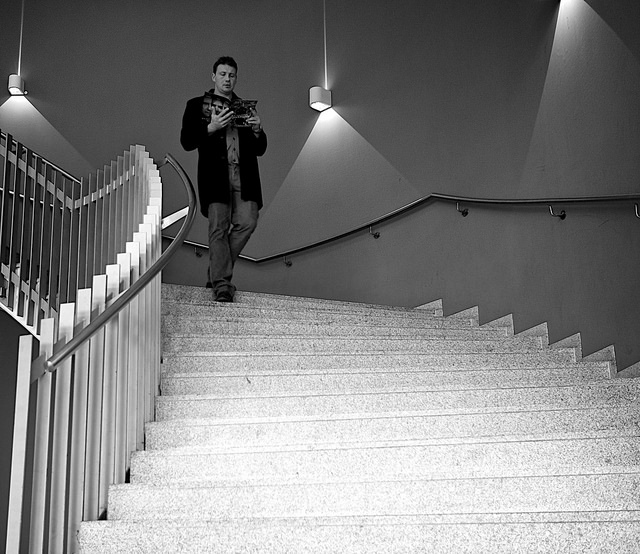The Multitasking Myth
by Mark Jenney

For years, we’ve been told that individuals who can successfully multitask will go further in life because they’re more efficient and better overall at getting things done. Now, however, we’re finding out that this old truth may not be so true after all. Researchers at the highly prestigious Stanford University have recently found that multitasking actually leads to lower productivity levels and can cause cognitive impairments. Sound crazy? It’s not. Read on.
Is it Really Multitasking?
Just like you can’t be two places at once, you really can’t do two complicated tasks at once (or more than two things, as some eager multitaskers are wont to do). You’ve got only one brain, and while it’s capable of doing simple automatic behaviors concurrently (say, walking and chewing gum at the same time), it simply can’t concurrently devote full attention to multiple jobs that require more cognitive heavy lifting.
So when you think you’re multitasking, what are you really doing? You’re task switching, which is certainly possible (many of us do it all the time), but it’s just no good for your productivity levels, since time is wasted on the switches.
The Consequences of Doing Too Many Things
You might think that the result of multitasking is that you get more done, but that’s actually the opposite of what happens. Hopping around projects rather than focusing on just one slows you down as much as 40% . Plus, your work is more likely to be sloppy and error-ridden, as you don’t give anything 100% of your focus.
Multitasking can have other negative outcomes. For example, if you try to do too much at once, you’re much less likely to remember key bits of information from anything; your brain can take only so much at once! You’re also less aware of what’s happening around you because you’re trying too hard to not be distracted. The problem with that is that you may miss a great opportunity because all of your attention is divided up among too many different things. Finally, when you’re trying to multitask, your actions tend to become robotic, which can significantly stifle your imagination and creativity, two things that are so important in today’s business world.
And then there’s the stress that accompanies multitasking. If you’re trying to do too much at once, you can start to feel overwhelmed, which brings with it a whole host of symptoms like increased heart rate and depression. Plus, there’s evidence to support the idea that multitasking can shave points off of your IQ and even reduce density in the areas of the brain that are responsible for empathy and emotional control. Is it any wonder that people are especially irritable and short tempered when they’re trying to multitask? The worst part is that these moods may become more permanent as multitasking continues.
But What if You’re Good at it?
But wait, you say — I’m really good at multitasking! Well, you may think that, but according to a recent study done by professors at the University of Utah Psychology Department, you’re probably not nearly as good at it as you think you are. In fact, you may even be sort of bad at it. The study focused on people who try to talk on their cell phone while they’re driving, and while that may not be the same as the way you multitask, the study’s researchers insist that the findings can be extrapolated to apply to other situations as well.
Plus, even if you manage to effectively make multitasking part of your life, it can still be dangerous because you’re not paying full attention to your surroundings. Again, the main research is on the dangerous consequences of trying to do things while using a mobile device, such as car crashes, walking into people or things, and so on, but it still serves as a good reminder: when we’re at work, we genuinely have a hard time taking care of multiple things at once.
Missing Flow
Have you ever been so engrossed in what you’re doing that it just all happens very quickly? The time passes, you get a lot done, and you feel great? That’s a psychological concept called flow, a complete mind and body immersion in whatever you’re doing. You might call it getting into the groove, or being in the zone, but whatever it’s called, it’s an amazing sensation because you’re making every basket, answering every question correctly, and knocking every pitch out of the park. (Feel free to add your own metaphor here — the feeling is the same!)
The problem is that when you try to multitask, you never allow yourself to get immersed deeply enough in any one activity to achieve flow. So, not only are you missing out on these great periods of productivity, but you’re missing out on the great feelings that go along with it
The Solution? One Thing At a Time
Even though it sounds like the mantra of a 12 step program than a strategy for handling your workload, your best bet is to do one thing at a time. Multitasking is one of those things that seems much better in theory than it works in practice. You can’t do everything at once, and you shouldn’t force yourself to try.
Will there be times that you need to multitask a little bit to make it through the day? Probably. However, it’s never wise to make it your modus operandi. Tackle your tasks one at a time, and you’ll likely find that you’re more productive, less stressed, and happier at work — and in life.